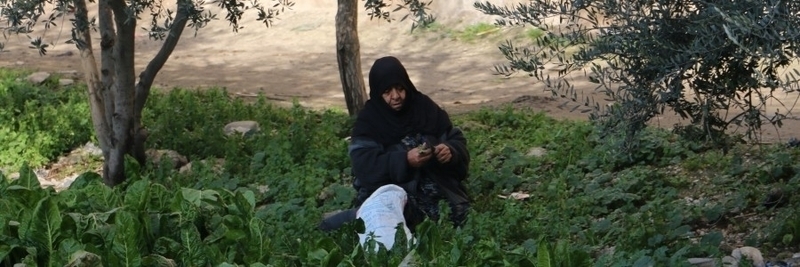My mother is in her late forties, and she can’t read or write. She has been attending literacy classes for the past 10 years, and now knows the shapes and sounds of the Arabic alphabet, but she still finds it impossible to link the letters together to make words.
She hoards junk in a spare room – old baby strollers, cardboard boxes, plastic bags, even empty toothpaste tubes. She believes these things might come in handy one day.
My mother hates to be touched, and she never hugs me. To her, I am an eccentric, because I am a female activist.
“We aren’t as strong as them,” she said over and over again. She seemed to think that just repeating that statement would put an end to my rebellion.
The second time I was arrested, her reaction was less fierce, even though I was gone for several days. When I came home, she told me our friend Ayman had disappeared. He had been taken from his house in Eastern Ghouta. The house belonged to my brother, who had been planning to move in there once he got married.
The news seem to shake my mother.
The third time I was arrested, I was gone for a few months. After I was released my mother told me she had decided to end a close friendship, on the grounds that her best friend supported Bashar al-Assad.
In 2011, my friends and I decided to visit Eastern Ghouta to see for ourselves how things were after it had fallen to the government. We turned to my mother for information. She had been visiting my brother’s empty house on a regular basis to water the plants, as well as delivering food and money to people in need.
She told us where checkpoints had been set up, and how strict the soldiers manning them were. She told us which surnames they looked out for, and what the best times to travel back and forth were. She also knew when the electricity would be cut off in the area, and what items residents needed most.
Towards the end of that year, the Free Syrian Army (FSA) grew stronger and managed to regain control of Eastern Ghouta. Residents faced a difficult choice between staying in their homes and leaving the area. Staying meant stepping back in time to a primitive way of life with no prospects of improvement on the horizon, but leaving meant displacement.
Those who decided to move out would occasionally visit their homes in Eastern Ghouta, to collect tokens of their old lives and bring them back to Damascus. Most of them now lived in overpriced rented flats or shared lodgings with their parents, siblings and children.
Up until the end of 2013, when the government imposed a total siege on Eastern Ghouta, my mother visited the area two or three times a week. Despite the short distance between the city and Eastern Ghouta, a suburb, the journey took a whole day.
Every time she got ready to go there, she would ask me, “Is this situation going to last much longer? I’m fed up!” For her, I was a reliable source of information as I was a former detainee.
My mother also began to tell me stories about the arguments she used to have with her classmates at school. Some of them were oblivious to the cruelties practiced by the Assad government, while she was proud not to support criminals and murderers.
On one occasion, she almost got me arrested for a fourth time. We had met an old friend of mine who supported the government. My mother was unaware of this and gave her a meaningful nod, telling her I was an active member of the opposition. My friend told her uncle, who worked in national defence. By some miracle, I wasn’t arrested.
It was only then that my mother realized she couldn’t talk freely about politics. She wasn’t happy about it and complained to me, “So why did you start a revolution?”
My mother continues to follow the news so that she can give me updates over the phone. She uses simple codes when referring to the government. “You know, the people you don’t like,” she says.
She is a brave, spontaneous person, and her will to survive during the darkest of times never ceases to amaze me. What she does is no less than what any other activist living in Damascus does. She is one of them. She just doesn’t know it.
This article was republished with the approval of Damascus Bureau


